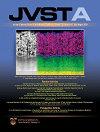原子层蚀刻氧化铟锡
IF 2.1
3区 材料科学
Q3 MATERIALS SCIENCE, COATINGS & FILMS
引用次数: 0
摘要
这项工作介绍了利用 BCl3 热表面改性和低离子能量 Ar 等离子体改性表面去除溅射铟锡氧化物(ITO)薄膜的原子层蚀刻(ALE)工艺。在这种方法中,由于氯氧化铟的挥发性较低,因此需要较高的温度来实现高协同 ALE,事实证明 150°C 是合适的温度。每周期蚀刻 (EPC) 为 1.1 Å,ALE 协同作用达到 82%。表面改性和改性表面去除步骤都表现出自限制 EPC。ALE 工艺是在传统的反应离子蚀刻工具中开发的,能在晶片上保持薄膜的绝对均匀性。使用光刻胶作为 ALE 的蚀刻掩模,在整个晶片上对 ITO 进行光刻图案化,观察到未掩模区域明显平滑,这是理想 ALE 工艺的特征。这证实了所开发的 ALE 工艺可用于使用传统光刻技术绘制 ITO 图形。所展示的 ITO ALE 可用于制造薄沟道或凹沟道晶体管等,其沟道具有自平滑功能,可减少表面散射。本文章由计算机程序翻译,如有差异,请以英文原文为准。
Atomic layer etching of indium tin oxide
This work presents the atomic layer etching (ALE) process for sputtered indium tin oxide (ITO) thin films using thermal surface modification with BCl3 and modified surface removal by low ion energy Ar plasma. In this approach, an elevated temperature is required for high synergy ALE due to the low volatility of indium chlorides, and 150°C is proved to be suitable. An etch per cycle (EPC) of 1.1 Å and ALE synergy of 82% was achieved. Both surface modification and modified surface removal steps exhibited self-limited EPC. The ALE process was developed in a conventional reactive ion etching tool and retains the thin film absolute uniformity on the wafer. ITO was photolithographically patterned on whole wafers using photoresist as an etch mask for the ALE, and clear smoothing of the unmasked areas is observed, which is a characteristic of an ideal ALE process. This confirms that the developed ALE process can be utilized to pattern ITO using conventional photolithography. The demonstrated ITO ALE can be used to fabricate, for example, thin channel or recessed channel transistors, with self-smoothened channels for reduced surface scattering.
求助全文
通过发布文献求助,成功后即可免费获取论文全文。
去求助
来源期刊

Journal of Vacuum Science & Technology A
工程技术-材料科学:膜
CiteScore
5.10
自引率
10.30%
发文量
247
审稿时长
2.1 months
期刊介绍:
Journal of Vacuum Science & Technology A publishes reports of original research, letters, and review articles that focus on fundamental scientific understanding of interfaces, surfaces, plasmas and thin films and on using this understanding to advance the state-of-the-art in various technological applications.
 求助内容:
求助内容: 应助结果提醒方式:
应助结果提醒方式:


